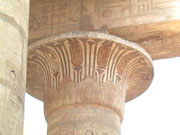INFORMATION FOR TRAVELLERS TO
EGYPT
EGYPT
Welcome to 'B.C. Archaeology', the Australian tour company specialising in travel to ancient world destinations. We currently take tours to Egypt, the Sudan, Turkey, Greece, Sicily and Malta, Spain, Morocco, and Tunisia. This year we are also taking tours to Burma and Cambodia. In the future we intend to expand into ancient meso-America (Mexico, Guatemala and Belize) and also South America (Peru). The following information is provided to assist you in selecting and preparing for your holiday. The details are provided only as a general guide to help you prepare for your tour.
ACCOMMODATION
We select our hotels with care and in most cases the hotel has been used by a member of our staff. We look for high standards of comfort and charm, and like a welcoming atmosphere. An important consideration is location - we have a strong preference for small, quiet hotels in the historic centre of a city, preferably close to local caf�s and restaurants. These are often family run hotels or pensions which have friendly and helpful local staff.
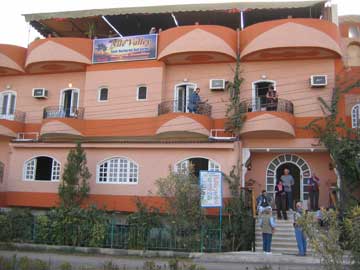 |
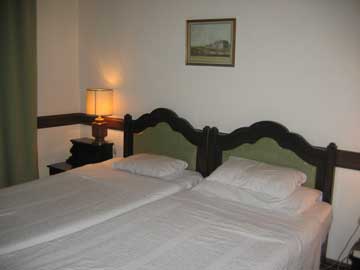 |
Nile Valley Hotel in Luxor |
The Cosmopolitan Hotel in Cairo |
We mainly stay in quality 3-star hotels, although we do sometimes include 4-star accommodation in our programs. The cruise on Lake Nasser is a 5-star experience. The star-ratings are those quoted by the relevant national or regional authority. We expect that each room will be clean and well maintained - most rooms will have air-conditioning or fans, a television and a refrigerator. WE ONLY USE HOTELS WHICH HAVE EN SUITE WESTERN-STYLE BATHROOMS WITH TOILET AND SHOWER OR BATH.
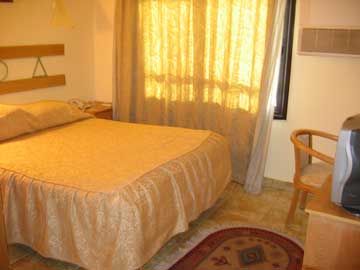 |
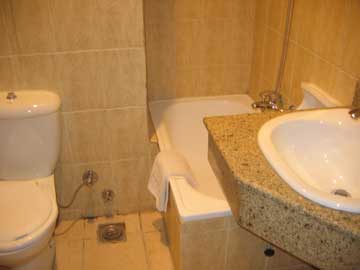 |
The Marhaba Hotel in Aswan |
The Marhaba Hotel in Aswan |
The price of each tour is based on twin-share accommodation although a single supplement can be pre-arranged (see Single Supplement below). Double beds can often be arranged for couples but please be aware that they may not always be available. Accommodation is on a 'Bed and Breakfast' basis with Breakfast served in the hotel. The food that is provided will vary from hotel to hotel but is usually 'Continental Style' with bread and jam, fuul (broad beans), coffee or tea (see Food below).
CLIMATE
Egypt lies in North Africa, which means that it is generally very hot and dry in the summer (June-August), warm and sunny in autumn (September-November), cool and generally sunny in the winter (December-February) and warm and sunny in spring (March-May). The most changeably weather is in winter when it can be cloudy and cool, and it often rains in the north. In Egypt most rain falls in January. You may wish to pack a light rain proof jacket as a precaution but it does not rain very much outside this period. The following data should give you some idea of the type of weather that is found in the areas we visit:
| Jan temps | April temps | July temps | Sept temps | Annual Rainfall | |
| Alexandria | 11-18�C | 15-22�C | 23-29�C | 23-28�C | 200 mm |
| Cairo | 8-18�C | 13-28�C | 21-35�C | 23-32�C | 30 mm |
| Luxor | 12-20�C | 15-30�C | 23-38�C | 24-34�C | 15 mm |
| Aswan | 11-22�C | 20-34�C | 27-41�C | 25-39�C | 0 mm |
CLOTHING
Egypt is theoretically a secular state but the population is predominantly Muslim (about 10% are Coptic Christians). Out of respect for local custom it is recommended that modest clothing be worn at all times. Women, ideally, should cover the upper part of their arms, and avoid wearing brief shorts. When entering a mosque, it is polite for western women to cover their hair and shoulders with a scarf. Men should wear long trousers/jeans when visiting a mosque and avoid short shorts and singlets generally. You will, however, see plenty of tourists wearing a great deal less!
Light cotton clothing is best for travelling. Take plenty of T-shirts and light trousers. When packing, remember that you will not normally need winter clothes such as heavy jackets. LAYERS OF CLOTHING ARE USEFUL so that you can adjust to the increasing temperature during the day. Bring a jumper and a light jacket. It will generally be cool in the morning, warm to hot during the day, and warm to cool at night in the periods when the Company visits Egypt. It is best to pack light since you can always buy T-shirts and other clothing. FLAT, COMFORTABLE WALKING SHOES like sandshoes or trainers are the most appropriate foot wear. You might also like to bring some smart casual clothes for evening wear.
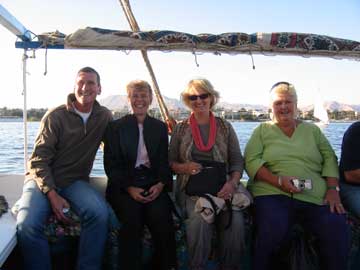 |
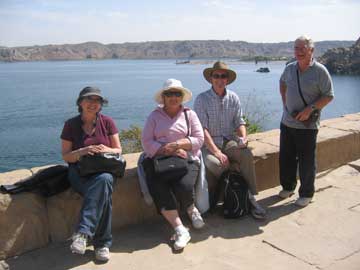 |
Sailing at Luxor |
Philae Temple |
Washing can be done for you in the hotels - this is cheap and reliable. You may wish to buy local washing powder (or bring your own) to wash small items of clothing. Make sure you bring a 'universal bath plug' - some hotels may not provide sink plugs or they may have gone missing. You might also like to bring a light washing line which can be strung up in the bathroom, or on the balcony, and some clothes pegs.
Sunburn is a problem for travellers and can be avoided by wearing a hat with a broad brim and applying plenty of sun cream. Wear long sleeved shirts in preference to short sleeved ones if you have sensitive skin. It is advised that you ALWAYS WEAR A PAIR OF SUNGLASSES when we visit archaeological sites - the sun can be very bright and there is a great deal of reflected light from the rocky surfaces.
COMMUNICATIONS
Egypt has a well developed tourist industry and it is easy to acquire postcards and stamps from kiosks, shops and news stands. Post offices in the main cities are open long hours. You can also acquire postcards and stamps at museums and tourist sites.
The telephone service is generally good - there are numerous communications businesses which offer international calls and most of the hotels we stay in also offer this service. You can often use the phones in the hotel but be aware that they will include a surcharge. If your mobile phone has global roaming you can use it throughout Egypt - the main companies are MobilNil or Vodafone. The international code for Egypt is 20 and the access code for making international calls while in Egypt is 00.
The internet is widely available in Egypt, and many hotels and businesses have e-mail facilities. There are numerous internet caf�s - experience has shown the service to be cheap and reliable. Cybercafes are increasingly becoming connected to broadband services which are gradually increasing the speed of the connections.
ELECTRICITY
The electricity in Egypt is 220 volts. In Egypt the plugs are of the two-pronged European type with round section. You can also take a universal adapter for your electrical appliances.
FILM AND CAMERAS
Film is widely available in the tourist areas and is generally reasonably priced, but you will probably get your film cheaper at home and it is thus worthwhile taking enough to last the whole trip. It may be difficult to find slide film everywhere. It is possible to get your photographs printed relatively cheaply but it may be better to wait until you get home if you have doubts about the quality.
Digital photography is widespread in tourist areas in Egypt and it is relatively simple to find places where digital photographs can be burnt onto CD's. However in some of the towns we visit, such as Minya, it may not be easy to download your flashcard. It is much easier and less of a hassle to take a number of flashcards (memory sticks) which can be downloaded when you get home, or you can take a laptop, a MP3 or similar storage device onto which you can download your photos.
In Egypt there are restrictions about photography in museums and at the archaeological sites - but you may need to pay to use a camera in museums, and generally will not be able to use a cameras within enclosed spaces such as tombs. As in many countries it is forbidden to photograph military and government installations - these are generally clearly identified with signs. As a courtesy, you should ask permission before taking photographs of people.
FITNESS
Participants should have general fitness as most day tours include some walking - the amount of walking varies from day to day. The 'B. C. Archaeology' programs are designed to be 'Study Tours' and as a result we tend to spend longer than the usual tour program exploring the historical sites. Buses are not always able to arrive directly at the archaeological sites we are visiting and thus a short walk may also be required to get to the site. Access to some sites involves climbing stairs, or walking across rough ground. Those with mobility problems need to consider carefully whether they are capable of such activity.
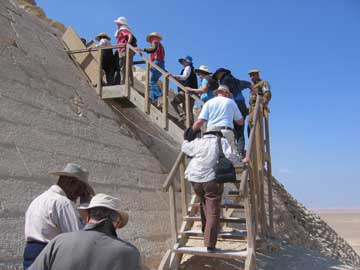 |
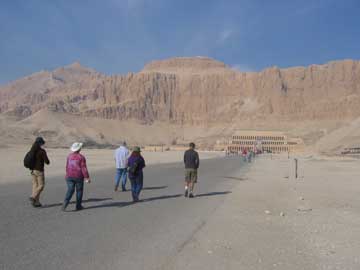 |
Entering Medium Pyramid |
Walking to Deir el Bahri |
We often take short breaks, when we rest and sit down to discuss the significance of what we have been looking at. We also try to provide plenty of time in the program for rest and relaxation.
FOOD
The 'B.C Archaeology' tours operate on a 'Bed and Breakfast' basis i.e. they generally only include breakfast at the hotel. This usually consists of fresh bread, danishes, jam or honey, olives, eggs, cold cuts. Some hotels will provide a more elaborate buffet style breakfast with toast.
We select hotels which are close to a range of inexpensive restaurants and eating places where we can sample a range of traditional local meals - as a rule western cuisine is often also available. Where possible we stop during the day for a light lunch or snack in a local caf�. If a site is not close to a caf�, a picnic lunch might be organised in advance (tour participants buy some food the night before and share). Egypt does not have good coffee as a general rule (Nescafe instant is usual! And it is expensive) - 'Turkish Coffee' is definitely preferable. We always bring a coffee plunger for morning coffee.
Egypt has a wide range of delicious local cooked dishes and snacks available. The local cuisine usually consists of rice with meat and/or vegetables. The food can be a little spicy but is not usually hot. Most hotels and restaurants cater to a western palette, but it is worth experiencing Middle Eastern dishes. Remember, you have come to experience everything that these countries have to offer!
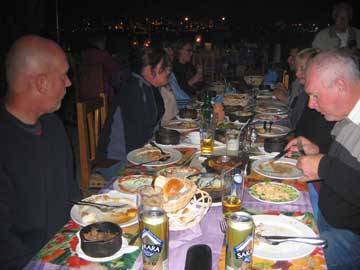 |
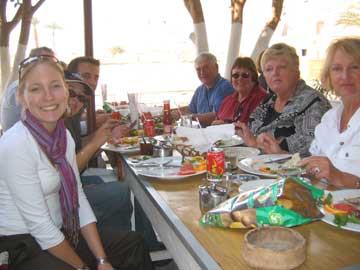 |
Dinner at Luxor |
Lunch at Luxor |
Travellers often avoid salads in Egypt but this is not really necessary, particularly as the tomatoes and cucumbers are so much better than in Australia. They actually have taste! It is recommended, however, that you avoid leafy salad vegetables. Vegetables and fruit that can be peeled and washed or cooked are generally safe to eat. Food that has recently been prepared or cooked is least likely to make you ill; avoid eating food which has been kept warm for long periods.
For lunch we normally stop at a small caf� and have soup or salad with bread and dips such as hummus. This should cost about A$5-10. The evening meal is usually more substantial and we normally visit a restaurant or eat at the hotel. This may cost A$8-20 each. More fancy nights out can be arranged at some point during the program.
FREE TIME
All tours include some free time; this varies depending on the tour program. Generally we try to see as much as possible during our stay and we will often be away from the hotel between 8am and 5pm including travel time. The itinerary usually includes a free morning or afternoon every couple of days which can be used to rest or explore the local area. We also try to include one free day in the middle of the program as a total break. Evenings are usually free to relax, wander in the markets or socialise with other members of the group.
HEALTH
Most frequently used medicines, such as Paracetamol and antibiotics are widely available over the counter in Egypt, without a prescription. Chemist shops are common but it would be advisable to bring some medicines for daily use such as pain killers, throat lozenges and plasters. If you have a special medical condition, it is recommended that you take enough of your medication to last you the length of the trip rather than trying to get the medication locally. Please advise the tour leader about any medical conditions which may affect your ability to travel (such as diabetes). Women may wish to bring their preferred feminine hygiene products as these may not be commonly available.
An upset stomach is a common complaint amongst tourists and normally passes in a day or two - it is mainly caused by the change in food and water and exposure to different bacteria and dehydration. It is useful to have basic mediation like Lomotil which can treat such problems. It is common to get a cold while travelling due to exposure to new viruses - cold and flu medication is worth taking with you as a precaution. Please remember that antibiotics are not useful for treating a cold and can actually make you feel worse by eradicating your good internal bacteria.
CONSULT YOUR DOCTOR FOR FURTHER ADVICE about vaccinations and additional medications that you might need while travelling. Your tour leader will try to provide whatever assistance he/she can in the event of illness, but keep in mind that they are not medically trained.
INSURANCE
The tour price does not include the cost of travel/health insurance. The participant must purchase this separately - no one will be permitted to travel without proof of purchase of insurance. Neither B.C. Archaeology nor Dr Michael Birrell is responsible for your health or possessions.
MONEY
The local currency is the Egyptian pound (known in Arabis as the guinay) which consist of 100 piastres. ATM's are widespread in Egypt and it is often possible to access your savings and cheque accounts using your ATM cards. Most ATM's accept western cards - particularly those displaying Mastercard Cirrus, Maestro or Visa Plus. Instructions are always available in English. Previous experience has shown that those with St George Bank cards may have trouble accessing their accounts due to problems with the PIN. Prior to departure please check with your bank whether you have a card which complies with overseas machines. EFTPOS facilities are not available in Egypt.
Cash, particularly American dollars, Euros and English Pounds, can be readily exchanged. Avoid taking Australian dollar traveller's cheques and do not depend on Australian dollars always being exchangeable.
Traveller's cheques in American Dollars, English pounds or Euros can be changed at a limited number of banks and designated exchanges - they seem to be going out of fashion these days as most tourists use the ATM machine to access their own accounts. If you decide to use them, you must present your passport before the bank will change the cheques. Keep the receipt somewhere other than with the cheques in case you lose the cheques. Avoid taking Australian dollar traveller's cheques as they are not widely used and will probably be rejected.
It is a good idea to take a variety of different sources of funds:
- travellers cheques in American dollars or English pounds
- some cash (Euros, English Pounds or American notes are best, preferably small denominations)
- some ATM cards
- some credit cards
PASSPORTS AND VISAS
Make sure that your passport is current and that it does not expire in the six months after you are due to arrive in Egypt - if it does, please arrange to have a new one issued before travelling.
You will need a visa to enter Egypt. The company will organise to have the visa stamped in your passport before your departure - the cost of the visa is already covered by the program.
SECURITY
Egypt is generally a very safe country - about 8 million tourists visit each year. The government is very concerned for your safety since they do not want anything to happen to the tourist industry. You may see some security guards at major tourist sites, and most museums may have metal detectors and bag checks.
Egyptians are very friendly, generous and welcoming - it is not uncommon for locals to want to talk to you. It is extremely rare that a foreigner is assaulted or robbed but it is possible that a Western woman walking alone may receive unwanted verbal harassment. If you feel uncomfortable, it is better to walk in a group.
It is always a good idea to be security conscious wherever you travel. The hotels we stay in are generally very safe and give personal service but it is best not to tempt fate by leaving money or valuables lying around in your room. It is safer to take a money-belt rather than a wallet, particularly when walking in crowded places such as markets. Try not to display large amounts of money when making purchases - take only as much money as you think you will need on a particular outing and leave the rest locked in your luggage. It is safer to use a credit card if you are going to buy costly items rather than carrying large sums of money. Keep in mind that expensive watches, jewellery and cameras may be tempting targets for thieves.
Keep precious possessions, such as passports, secure in your luggage. Make sure you have two keys for the locks and keep them in separate places in the event that one gets lost.
It is worth making photocopies of your passport cover sheet, airline tickets, and credit cards - keep one copy with you in a separate place from the originals and leave another copy with someone back home in Australia. You must have travel insurance against loss or damage of possessions - it is worth taking a copy of the policy and the contact numbers in the event of an emergency.
SINGLE SUPPLEMENT
If you are travelling on your own you can opt to share with another group member of the same gender or pay an additional fee for a room on your own. A 'single supplement' normally costs $900 extra per person. No person travelling on their own will be required to pay a single supplement in the event of their being no fellow traveller to share with. B.C. Archaeology reserves the right to co-ordinate the room arrangements if there is no prior agreement to share with another person before the program.
It is understood that fellow travellers may snore. In the event that two travellers are not compatible in a twin-share arrangement, a single supplement may be required from the participant who does not wish to remain in a share situation.
TIPPING
In Egypt wages are low in comparison with Western wages - most people, including the hotel staff you meet, earn a very limited salary which may be as low as ONE or TWO AUSTRALIAN DOLLARS per day! Tipping for a meal is usual and 5-10% is usual. Always tip if someone goes out of their way to help you - you may wish to leave some change in a caf� or restaurant. Always carry plenty of small change to hand out during the day. A toilet visit will cost between 50 piastres and 1 pound (20c). Do not give money to beggars or children as this only encourages begging and is frowned upon by those who work. Buy some pens, sweets or Australian souvenirs like small koalas to hand out to children as these are often appreciated.
The company will cover the cost of tipping hotel porters but it would be appreciated if the Egyptian guide who accompanies us be given a tip at the end of the program. It is recommended that this be about $20-50 per person. More can of course be given if the guide has gone out of their way to assist you on the tour.
TOILETS
In Egypt public toilets are practically unheard of and you probably wouldn't want to use them anyway. Caf�s and restaurants provide toilet facilities and most archaeological sites and museums have washrooms as well; however they can be variable in standard. It is recommended that you carry a packet of tissues for occasional use; antiseptic wet wipes (wet ones), or antiseptic gel, can also be handy for cleaning your hands before eating.
TRANSPORT
For the international flights we fly economy class on Singapore Airlines. Business Class seats can be arranged upon payment of additional charges. Within Egypt we use Egyptair.
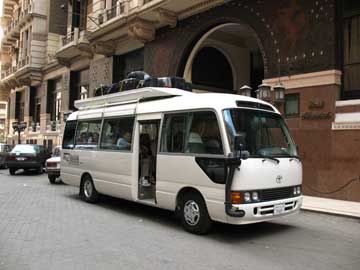 |
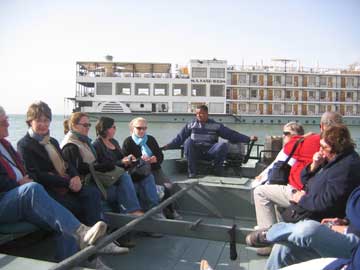 |
Bus in Cairo |
The Kasr Ibrim Cruise boat on Lake Nasser |
Travel within Egypt and daytrips to archaeological sites are by an air-conditioned 'Coaster Bus' which sits a maximum of 27 passengers. Some of the luggage may need to be placed on the roof rack where it will be tied down. On Lake Nasser we travel on a 5-star luxury cruise boat.
WATER
BOTTLED DRINKING WATER IS WIDELY AVAILABLE AND INEXPENSIVE AND IS HIGHLY RECOMMENDED. The Company will normally buy water for the group. The tap water in major cities is safe to drink, but it is heavily chlorinated and more likely than the bottled water to contain bacteria that may cause an upset stomach or give you a cold. It is safe to brush your teeth in tap water, but to be on the safe side you may prefer to use bottled water.
It is very easy to get dehydrated, particularly as we will be walking around archaeological sites. ALWAYS DRINK PLENTY OF WATER. Bring a small water bottle with you into which you can decant some mineral water. It is useful, but not essential, to bring re-hydration salts in the event of sunstroke.
WHAT TO BUY - AND HOW MUCH MONEY SHOULD I TAKE?
There are very few real antiques for sale and it is illegal to export the real thing anyway. Egypt is famous for a number of products such as painted ceramics, copper vessels, inlaid wooden boxes, leather, carpets and textiles, jewellery, and small souvenirs. In Egypt there is a range of guidebooks available at the sites or in local bookshops. Remember to leave some space in your luggage for souvenirs.
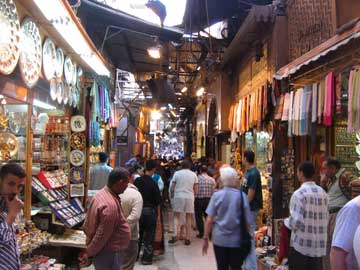 |
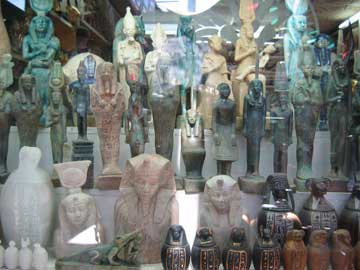 |
Khan el Khalili markets in Cairo |
Statues for sale in Luxor |
The cost of the tour covers all accommodation and breakfast, transport to and entry to all archaeological sites and museums. Meals should cost about A$20 per day per person and miscellaneous expenses such as water, fruit, chocolates, coffee will be additional. Depending on what you want to buy, a good estimate for total expenses is an additional A$800-1000 per person.
WHAT TO TAKE - SOME SUGGESTIONS
A light small day-pack that you can carry every day to sites
Camera and spare batteries for your camera
Additional flash cards for a digital camera
Film - it is better to bring your own and is likely to be cheaper
A hat, sunscreen and sunglasses
A small bottle for drinking water
Sensible walking shoes with flat soles
Small torch and batteries for exploring the sites
A converter for electrical appliances - 'European style' with two round prongs (or a universal adaptor)
Moisturiser cream and your familiar toiletries
Pharmaceuticals such as Panadol, throat lozenges and Lomotil
Universal plug for the sink/bath (not always provided)
A small towel to use as bath mat (not always provided)
A towel (just as a back-up - towels are provided by the hotels)
Washing line and pegs
Shampoo and soap, bandaids, 'Wet-ones' or tissues
A mobile phone if you think this is necessary - you will need 'global roaming' but remember that it is very expensive
Penknife, if desired, for cutting fruit etc. Always pack it in your main luggage, not your hand luggage, when flying - otherwise it may be confiscated at the airport security.
A few small padlocks to secure your suitcases. Keep the keys in two different places in case one set gets lost.
FINAL NOTE
The success of your holiday depends to a large extent on your individual approach. It is important to remember that you are a guest in another country. Egyptian culture is different to ours, so please respect the local customs. When entering a mosque please take off your shoes or wear the covers provided and cover your hair if you are female.
Remember, fellow travellers on the tour are drawn from many walks of life and a tolerant attitude can increase your enjoyment of the holiday. I hope you have a rewarding and enjoyable time.
